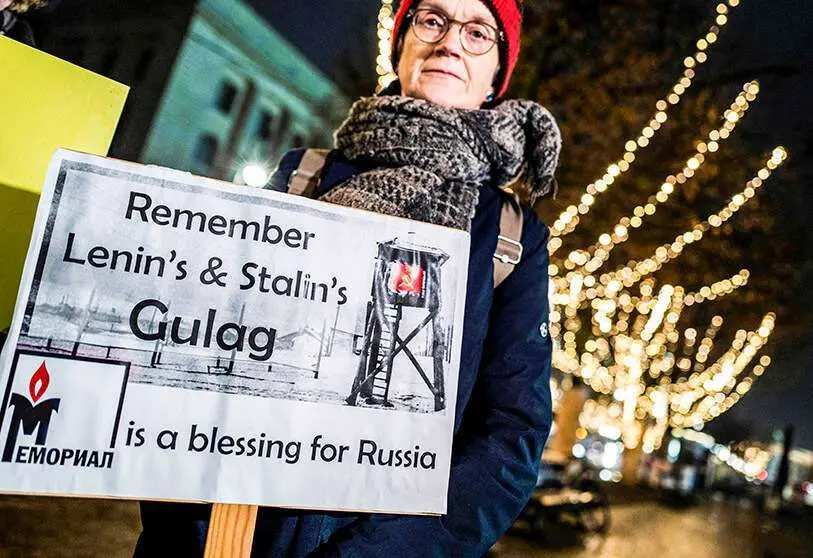Stalin returns: every dissident is an enemy of the people

Three successive court decisions in the space of just three days have spelled the end of what freedom may still be left in Russia. On Monday, 27 December, an appeals court extended the sentence to be served by historian Yuri Dmitriev, accused of sexual abuse, to 15 years in prison. The following day saw a much bigger blow: Russia's Supreme Court ordered the dissolution of the NGO Memorial. On Wednesday 29, a Moscow court did the same to the Human Rights Defence Centre.
The three sentences have a common link: the historian, the NGO and the Centre have all made a decisive contribution to the demystification of communism, its crimes, the history of the Union of Soviet Socialist Republics (USSR) and the new narrative that President Vladimir Putin wants to embed in the minds of 147 million Russians.
Yuri Dmitriev has been one of the architects of the fact that historians all over the world and the Russian people themselves have been able to have a true and documented knowledge of what happened in the great Moscow trials of the 1930s, of the holodemor (provoked famine) in Ukraine and of the persecution, imprisonment in atrocious conditions of millions of prisoners, all of them condemned under the generic condition of "enemies of the people".
The NGO Memorial, founded by the scientist and true democrat Andrei Sakharov in 1989, with thousands of collaborators from all branches of society, has in its archives more than three million documents proving the relentless and systematic genocide of three million citizens, and files pending further investigations of another nine million. A documentary arsenal that has enabled institutes, universities and libraries all over the world to delve deeper into the horrors of Stalinism. One of these researchers, Robert Conquest, puts the number of dead during the "Great Purge" and the famine during those years of Soviet terror at fifteen million.
As for the Human Rights Defence Centre, it is the branch of Memorial dedicated to investigating and documenting the persecution of political prisoners during the twenty-one years that Putin has ruled Russia, a period that will almost certainly last until he leaves this world, given the constitutional changes that allow him to perpetuate himself.
Among its most important investigations, the Centre has collected testimonies and all kinds of documents proving the abuses committed by Russian special forces in the Caucasus, especially during the two wars in Chechnya. The head of the Centre in that region, Natalia Estemirova, was murdered in 2009, but no one has yet been found guilty, as in many other cases across Russia's vast territory.
In addition to the allegations of sexual abuse, never acknowledged by Dmitriev, he and the two now-banned institutions have been found guilty of omitting that they are "foreign agents" in several of their documents, in accordance with Putin's law for any person or NGO receiving any kind of donation from outside Russia. And the nail is hammered home by accusing them of misrepresenting both the heroism of soldiers and civilians during the Great Patriotic War (the name given to World War II), and of presenting a distorted picture of the USSR under Stalin and even of Russia under Putin today.
With this blow to dissidence, Russia ends 2021 almost as it began, imprisoning Putin's bête noire, the opposition figure Alexei Navalny, a miraculous survivor of the poisoning attempt, who later returned to Russia in the conviction that he had to offer the country another political alternative. While his conditions in the prisons worsened from day to day, soon after, one after another, all his regional offices were closed, many of his leaders were arrested and imprisoned, and demonstrations in support of Navalny were harshly repressed.
Vladimir Putin, the new Russian tsar, the former colonel of the dreaded KGB, describes the demise of the USSR as the greatest catastrophe of the 20th century. With this conviction in mind, all his political and strategic moves are aimed at re-establishing Russia as the superpower it once was, respected throughout the world on an equal footing with the United States. This means, therefore, vindicating the figure of Yósif Stalin, putting him back on the pedestal of the great heroes, which at the same time means erasing the historical footprint of his crimes.
Its immediate European neighbours, those who knew first-hand what domination under the Soviet boot meant, have reason to worry. In order to undertake the "reconstruction" of the Soviet empire, the first premise is to tighten Russia's own ranks, or in other words, to nip dissent in the bud and brand dissenters as "enemies of the people". Perhaps we are on the verge of a second act of history, and that unlike Karl Marx, this one will not be repeated as a farce but as a new tragedy.

